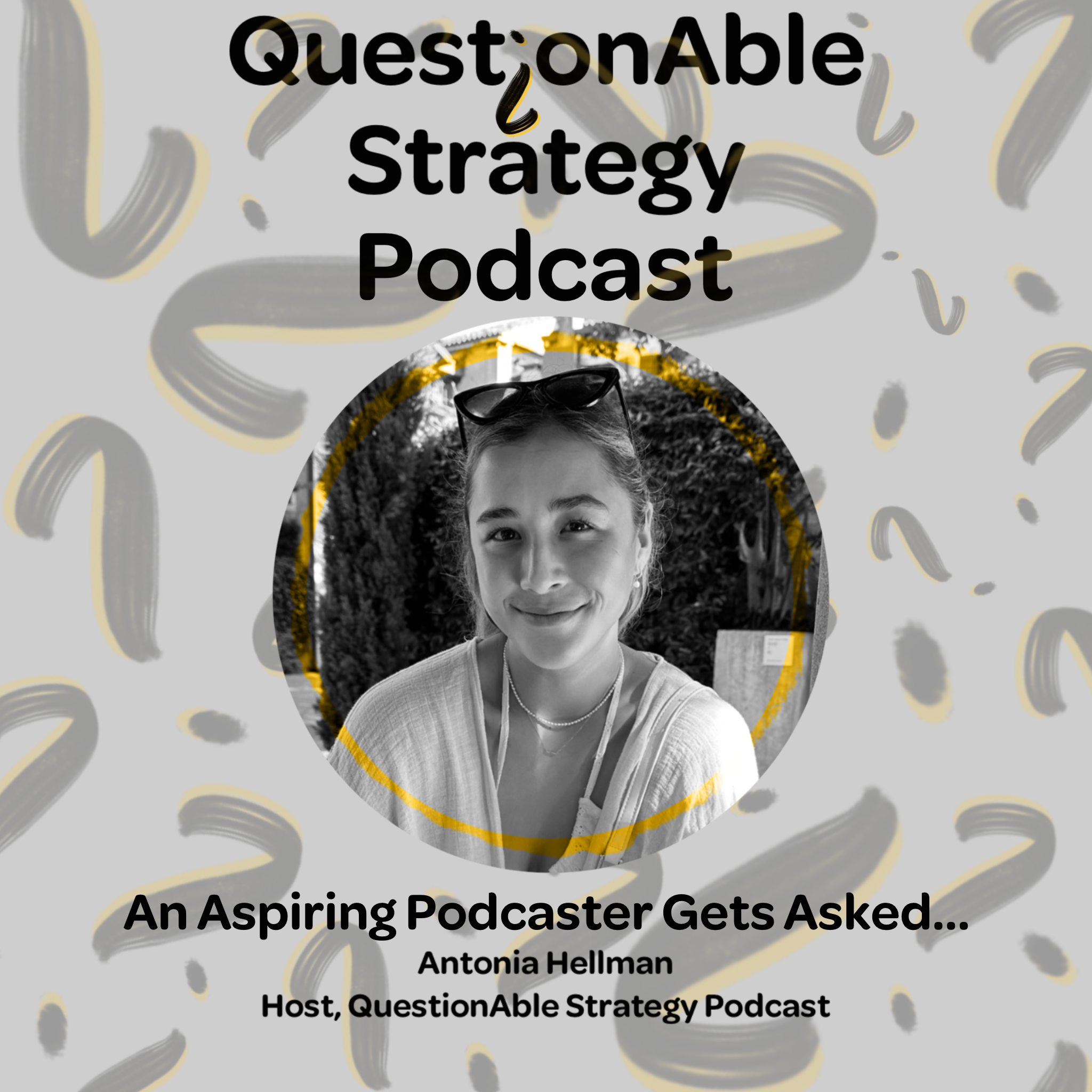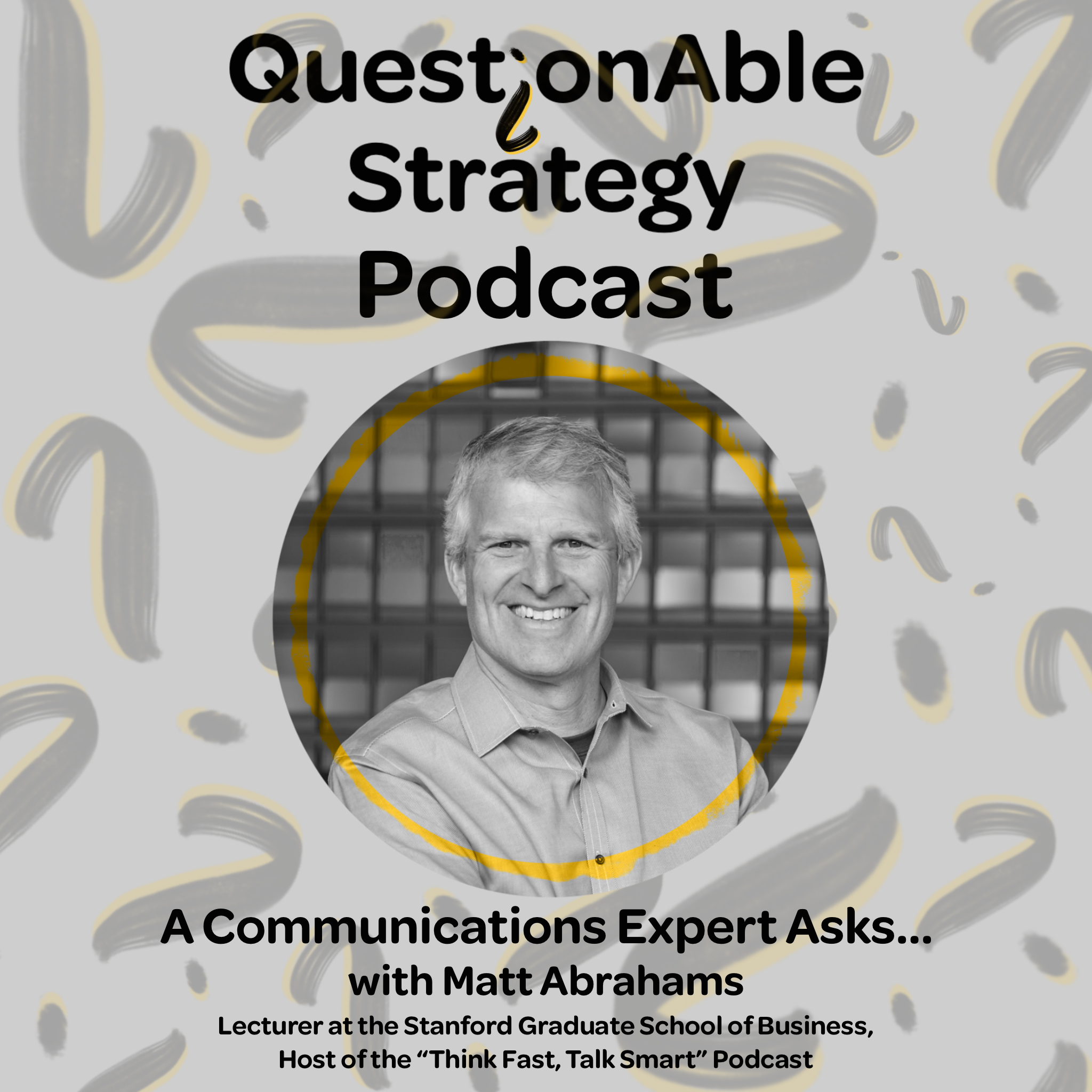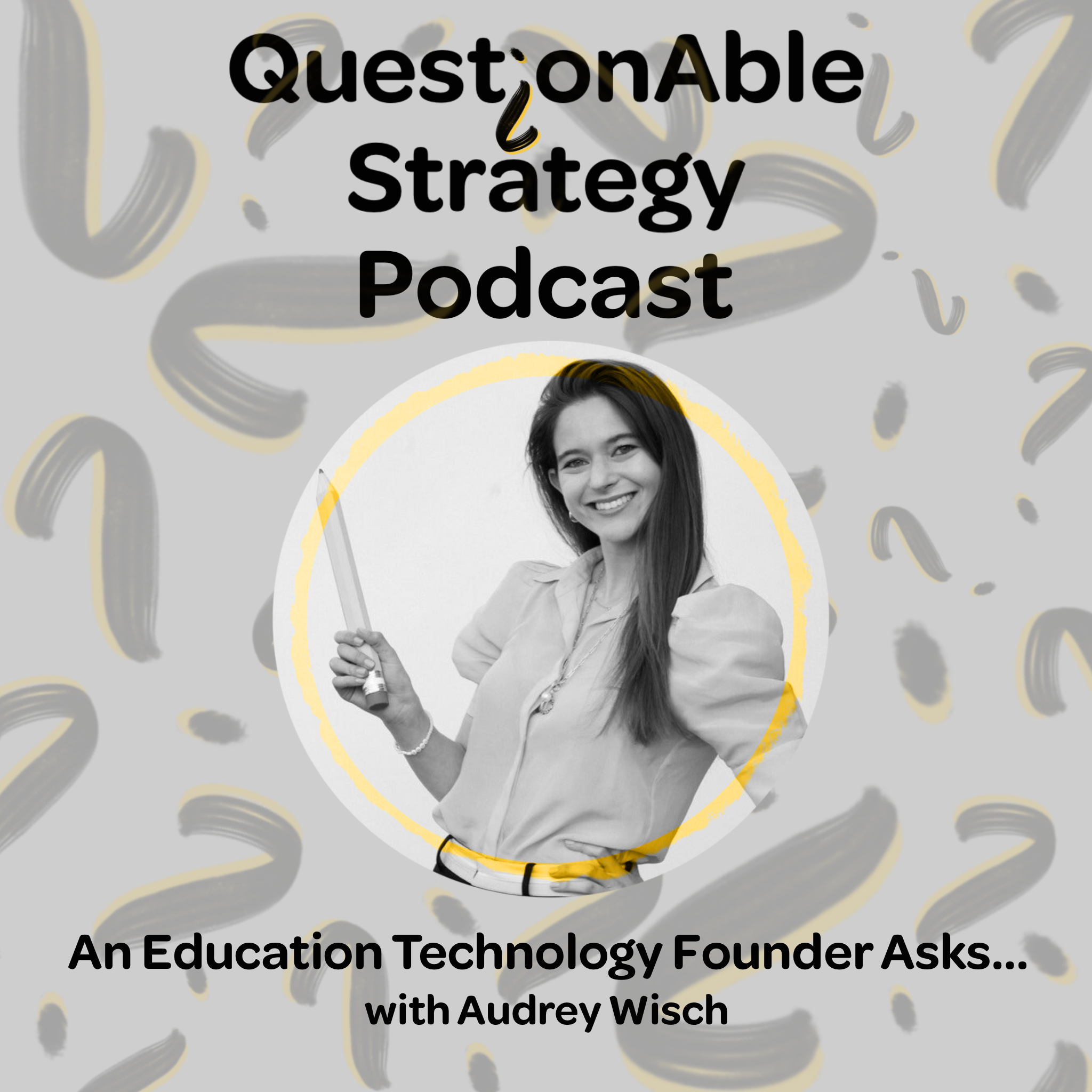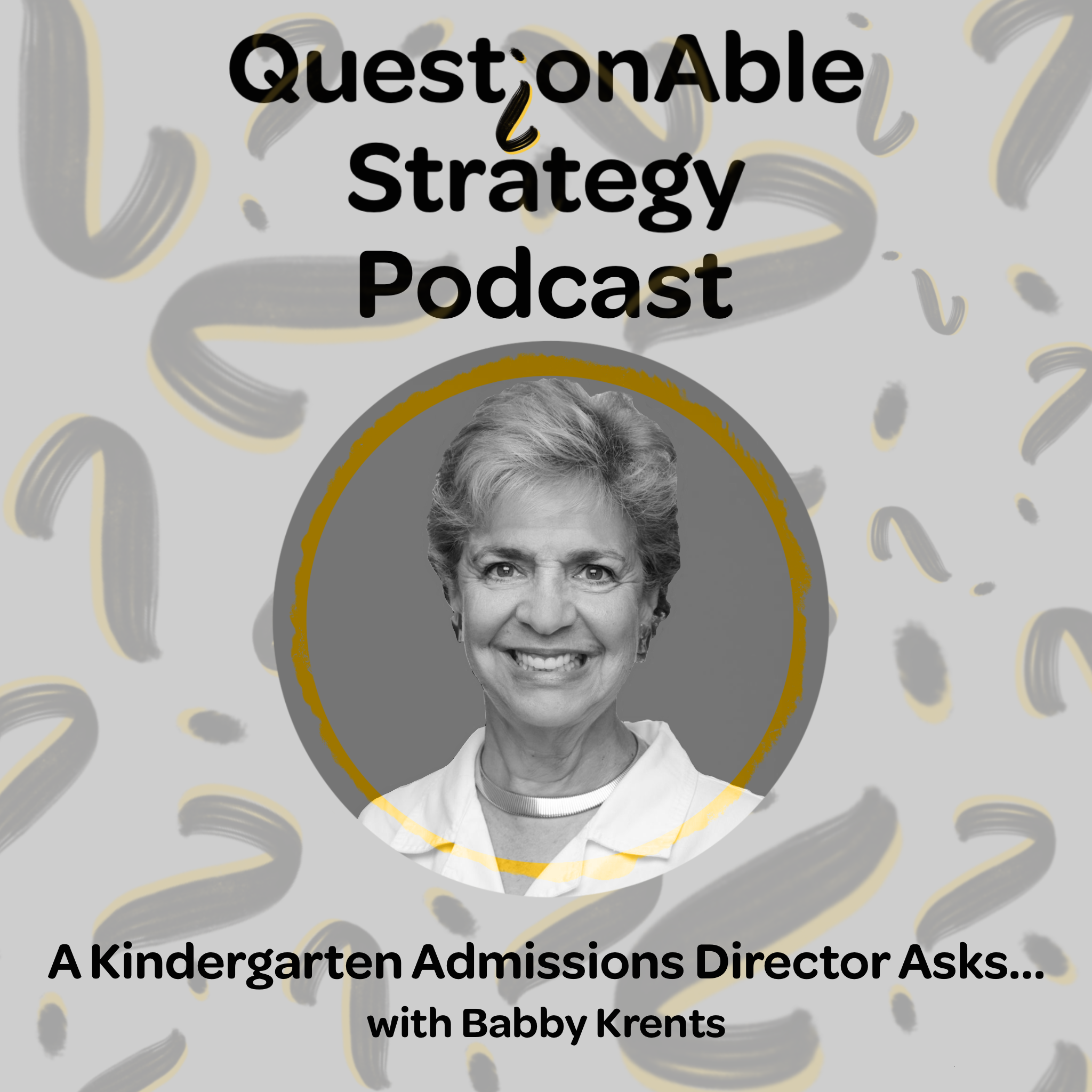Episode Transcript
Welcome to Questionable Strategy. I'm your host, Antonia Hellman, and I'm so excited to be kicking off this first ever episode of our podcast. This is something that I've been wanting to launch for a really long time So I'm over the moon that this has become a reality. for anyone who doesn't know me, that's okay. You'll get to know me a little bit more throughout this episode and also on All of our subsequent episodes, So transparently, as somebody who's starting a podcast about asking great questions, I get asked a lot of questions myself. And so over time, I've kind of compiled them into a bit of a list, and I decided that I wanted to have this first episode of the podcast be a solo episode, where I introduce myself and I introduce the motives behind starting Questionable Strategy. I wanted to take this time to talk with my listeners, really help you get a sense of what I'm doing, why I'm doing it, and who the hell I am. This episode will hopefully address, all of those burning questions, and ideally, spring up some new questions that we can work towards answering together the coming episodes. The setup of this episode is going to be more of a rapid fire kind of situation where I'm going to take that list of questions and I'm just going to address them one by one. If there's anything in this episode that you find particularly interesting, I assure you you're going to love the rest of the episodes that we have coming out. If there's nothing in this episode that you find particularly interesting, I challenge you to be a bit more curious so I also think that you'll love the episodes that we've got coming out so stay tuned to hear a bit more of the backstory behind questionable strategy and a plan for where we're going Questionable Strategy is a podcast that I'm really passionate about that's for anyone looking to improve their question asking skills. So, In thinking about if there's one skill that people can invest in to improve both their professional lives and their personal lives, it's asking better questions. And I think that for a long time, the people that I've admired the most in my life have been people who ask strong questions. And I didn't even know it. I didn't even know that that was what drew me to them and drew other people to them as well until I really. started thinking about the common thread between all of these fascinating people. By the way, these are people, not all folks that I know. They could be people on TV, people whose podcasts I listen to, people who are friends of friends, people who are in the public eye. The ones who ask the best questions are actually the ones who develop the strongest relationships. And so I've been really interested myself in exploring how I can get better at asking questions. I'm hosting this podcast for the same reason that anybody would listen to this podcast. It's something that I've been set on improving since I was little. I remember sitting in the audience of the auditorium in my middle school, That brought a lot of really interesting speakers to come and talk to me and my peers about loads of different topics and I remember sitting there listening to these speakers talk and trying to internalize all of the information that they've just spewed at us for an hour and then at the very end they would ask Oh does anybody have any questions for me and every single time there was one kid who would raise his hand And they'd call on him, and he would ask a brilliant question, on something that this speaker had brought up 25 minutes ago. And I was always stunned, and I really admired that kid, because I was still trying to catch up. I was, I was sitting there taking note of what this speaker was saying, and then By the time the question period had rolled around, I hadn't even internalized everything that they'd said. And this guy was already thinking so fast that he had something that he knew that he wanted to learn more about. I thought that this was a talent. I thought that this was a God given talent that this kid had and that I was never going to get to that level. But over time, what I've learned is that. Asking better questions is a skill. It's not a talent. You can practice it. This kid just happened to practice it every week at assembly and he got really damn good at it. But people who think, Oh, that's not me. That's absolutely not true. That can be you, and together, through QuestionAble Strategy, with all of the great mentors that I bring onto the podcast, we're gonna help us all get better. We're gonna all become that kid. What Do I think makes a good question? That's something that I'm trying to find out. Actually, as I've told people about this podcast, people tend to ask me that question, like I'm supposed to know the answer at the very beginning of the podcast. If I knew the answer, I don't think that I would be hosting this podcast. I think that it's a combination of factors. One being context, so asking a question in a social setting with your friends at a bar is very different from asking a question in a boardroom. So being able to read the room is incredibly important. then the next factor is relationship. So asking a question to your dad is really different than asking a question to a stranger on the street. And then the third factor that I think people don't take as seriously as they should, is emotion. So a great question elicits some kind of emotional response, whether it's excitement, anxiety, happiness, or thrill. Being able to remind somebody of an emotion with your questioning, will almost always give you a much stronger, more interesting answer. Another thing that I'll add is a really important component of asking great questions is fearlessness. Some people have a ton of fantastic questions swirling around in their brains, but they're too scared to actually bring them up. That's something that is really important to get over, and I'm excited to help all of my listeners find that confidence. The premise of the podcast is to have conversations with people who effectively ask questions for a living. And this looks very different if you are a late night talk show host versus if you are an interrogator versus if you're a couples therapist versus if you're an actor who's preparing for a role. And this all looks very different than if you're on a first date. So the premise is to have conversations with all of these experts, with all of these professionals from very different industries to learn about how it is that they think and how they ask questions in their professional lives. then how that bleeds into their personal lives as well. My belief is that even if you're not a late night talk show host, or an interrogator, or a couple's therapist, we'll all have something to learn from the ways in which these types of people ask questions. We can come away from listening to these conversations with nuggets of knowledge that we can then go and apply to our lives. I spend a lot of time listening to business podcasts and reading books about great pioneers and great innovators. But a lot of these people being profiled in these books or featured in these conversations are just unrelatable to somebody like me, young professionals, Gen Z, people who are just trying to find our start and understand our personal road to success. So it can be really hard to implement advice and guidance from people who are so removed from our situation. And that's not their fault, they just had a lot more life So I really wanted to create a channel where I could deliver. wisdom and guidance to people who are in my exact same place that they can implement right now. Anybody listening to QuestionAble Strategy can go out and use a lesson that they just learned from an episode of my podcast in their next conversation. Period. They don't need to wait. They don't need to prepare. They don't need to upend their life. And that's one of the reasons why I think QuestionAble Strategy is so special. It's easy to listen to, it's easy to implement, and asking better questions, I promise you, will change your life. I don't mean to be alarmist, but if you don't learn how to ask good questions, I think that you'll struggle to form genuine connections in your life. I think that people will have a hard time understanding you, you'll have a hard time understanding other people, you'll have a hard time finding your passion, and you'll also have a hard time seeing the passion in other people. Fundamentally, questions are a tool to help you understand somebody else or some other concept. And on top of that, asking questions is a way for you to build up your own bank of knowledge. So if you don't ask great questions, then you end up living a really bland life where you don't have great connections with other people and you don't know much about the world and there's so much to learn and that's not gonna just fall into your lap; you need to go out and seek it. A little bit of background on myself. I'm Antonia Hellman. I am a startup CEO of startup founder. I started my company when I was 21 and I didn't really come from a very business centric background in school. So that just meant that everything Was new to me in starting a company it came to working in tech and I also had to come to terms with the fact that I really didn't know that much and once I acknowledged that and Once I got comfortable with the fact that I needed to be a sponge in order to succeed, that's when I realized how important it was to know what you don't know. But it's really challenging to articulate what you don't know in a question that can help fill those gaps in knowledge. My job is to learn from everybody around me and to use that to get better and stronger and wiser and more capable. The greatest value that I've gotten from my experience in my career thus far is having conversations with people who are far more experienced than I am, and it's been a real treat and a real honor for me to be able to ask questions and learn from these people. Are they all in tech? No. Are they all women? No. Were they all young founders? No. But everybody that I've spoken to and everybody that I've learned from has contributed to my growth and changed my perspective. And so I think that as people like me, young professionals going out in the world trying to figure out what the hell we're supposed to do with our lives, as we try and better ourselves and try and become who we want to be, we should be trying to take in information and inspiration from all different corners of the world, from all different types of people, Who knows, that might actually inspire your next career move or your next big life decision. One story that inspired me to create the podcast. This was a totally normal interaction that I bet loads of us have every single day. It was a trip with an Uber driver. And I happened to be going to the airport. So I got in this Uber, and my Uber driver and I struck up a conversation, and I learned that he was actually in a punk rock band. He'd been in a punk rock band since he was like 15 years old, and he was now in his 30s. They were all still together and making music. I was fascinated by this, not as somebody who knows anything about punk rock. I don't know anything about punk rock, but That was the beauty of this interaction, because I was such a blank slate, I just sat in the back of the car, and I started asking him all of these questions about the band, and about songwriting, and about growing up with the band, and how the dynamic had changed, and where they all found inspiration. I was just, honestly, speaking from a place of genuine curiosity. And the guy, when he dropped me off, turned around and said, I really, wish that I'd been recording this conversation. I've been on many radio shows. I've been interviewed many times, and nobody's asked me better questions than you did. And that was really incredible to me, because, like I said, I never thought of myself as being A great question asker. I always thought that I was playing catch up to that kid in assembly who was always forever going to ask better questions than I ever could. And to have this stranger tell me that I did a really good job at something that I didn't ever think that I could be good at, was incredibly meaningful and, Inspired me to go out and try and help other people develop this skill. An example of somebody who's taught me something about asking questions that I've then implemented in my own life and practiced in my own life is Matt Abrahams actually has a podcast called "Think Fast, Talk Smart." And he's a professor at the Stanford graduate school of business. And I was listening to one of his episodes a little while back. And the focus really was on asking questions that evoke some kind of emotion. So instead of asking somebody, what's your favorite food? Instead, you could ask them, What food reminds you of home? Asking somebody what food is their favorite is kind of impossible. I mean, we have a favorite food, but there's probably not much to say on that topic. Instead, if you ask somebody what food reminds them of home, you'll get an answer. About a food that they love, but you'll also get a story about their childhood and about their family and about who cooked it for them and about when they would eat it and why that's meaningful to them. So just by changing one little element of that question, you get to know somebody a lot better. Why did I decide to call this Questionable Strategy? Well, I think that the word questionable is an interesting one because it means that something is able to be questioned. My question, as an English nerd myself, is Was, why can't it also mean that we are able to question? I just really liked the kind of double entendre. I can confidently say that with all of the guests that I'm bringing on and speaking to in each of the coming episodes, there's nothing dubious or questionable in the traditional sense about their advice and about their methods, rather with their strategies, we'll all be able to ask better questions. Success in doing this podcast looks. Like a couple of things for me. The first is if anybody can come away from listening to QuestionAble Strategy just a little bit more inspired to be more curious and Work on the craft of asking better questions. I consider that a win if I can teach people to open their minds to learning from non traditional mentors that's a win to me. And then very selfishly, if I can get better at asking questions, I'd love that. The top three people I'd like to have on my podcast. Number one, I would say is Alex Cooper, who for all of you who don't know, is the host of Call Her Daddy, which is a wildly popular podcast. And what I love about Call Her Daddy and what Alex Cooper has done is she's brought a lot of issues that are especially relevant to women to the forefront of a conversation where, they really haven't gotten much airtime at all in the past. Also I look up to her as an interviewer because she has this ability to get people to open up about really personal topics, not in a gossipy or gotcha way, but in a very safe, secure, supportive way. I really admire how she's able to do that and hopefully one day I could do that myself. Number two, I think, has got to be Sean Evans, the host of Hot Ones. I think that he does the best research. He and his team do such phenomenal research ahead of any interview and that's so meaningful to the guest. And it's so clear that the guest is just in awe by the care that's gone into the preparation. I think that thoughtfulness in the research is inspiring to any interviewer. And number three is a difficult spot to fill. And I'm actually going to leave that one a secret because there's a chance that she might actually be on the podcast. So there's a hint. It's a woman. But you'll just have to find out. Do I know anybody in the public domain who is terrible at asking questions? I think that's really harsh to put somebody on blast, especially if I'm trying to set myself up for success in getting guests on the podcast. What I will say, I'm not going to call anybody out in particular, but something that's really disappointed me as somebody who has a background working in politics, is that most of our representatives in the United States government right now are, this is going to sound ageist, let's just say on the older side. And are not well equipped to deal with technological advances and so some of the big facepalm moments that I've seen when it comes to questions are some of the questions that get asked in congressional hearings when talking about technology I don't think anybody should be shamed for asking questions that some people might consider to be quote unquote stupid, something that I want to promote through QuestionAble Strategy is that there are no dumb questions, and I think that curiosity should be applauded and celebrated in all ways, however, I think that some of the questions that get asked in these congressional hearings just demonstrate a total lack of effort when it comes to research and a lack of concern for the gravity of these situations apart from how it'll just affect their re election prospects. I think that that's disappointing coming from elected officials who are supposed to be the ones making rules that are going to dictate how our society runs. Have I ever heard a question that made me cry? There are questions that I've been asked that have made me feel like shit so I'm really speaking from a place where, like, I've experienced. bad questions that have made me feel bad. But at the same time, I've definitely also been witness to really beautiful questions that are said with a lot of love that would make you cry in a, in a happy way. But, um, no, if you're asking if anybody's ever proposed to me, the answer is no. Is there any such thing as a stupid question? I don't think that there is such thing as a stupid question if it's coming from a place of positive intent. I think that's one instance where somebody's motive really comes into play. If somebody's asking a question that demonstrates total ignorance, I think that's absolutely fine because not everybody knows everything about every subject. I think that usually the questions that get labeled as stupid questions are ones that get asked When the answer is either really obvious or really easily accessible through other means, like a quick Google search or paying attention. probably the closest thing to stupid that a question can get, is one where the answer was just said previously and you just weren't listening. So if you weren't listening, That's on you. Is there a question that has changed the world? Questions are the only thing that has changed the world because that's what pushes progress forward. All research starts with a question. Honestly, if you just think back to what children are like, and how we learn, and how we grow, it's by asking why. That's so annoying, but we all know that there's, you know, a four year old in our lives who's run around and just been like, why is the sky blue? Why is this? Why? Why? Why? Why? Why? But that's how we learn. That's how we develop a sense of the world around us. And with that foundation, we're able to ask the questions that lead to innovation. So I mentioned research, but also as a founder, any startup idea, any new technical advance starts with a question of, why can't we do this? Or what if we made this faster? Or what would fix this problem? Or why is this a problem? The response, that's a good question, is pretty loaded, because most of the time when people say it, they don't think it's a great question, they're just trying to stall. And I think that sometimes there are great questions, and when people say that to me, I feel really good as the question asker. But you have to take it with a pinch of salt. I think what people need to normalize, though, is taking a second and thinking about your answer, because in this world, we feel a lot of pressure to have an answer immediately Listen to the questions that you get asked. Take time to come up with your answers, because that's what keeps a conversation rolling. With your answers, you can then come up with a question to ask whoever it is that you're talking to. I want people to come away from listening to Questionable Strategy podcasts or reading our blogs knowing that listening is probably the most important piece of asking a great question. There are many components to a question beyond just the phrase that you say that ends in a question mark. So a little bit of a taste for what's to come in each episode of QuestionAble Strategy, I'm going to be speaking with somebody that asks questions for a living. And, at the end of every episode, I'm going to ask them the same question. So this is a spoiler alert, but hey, hopefully you'll stick around anyway. I'm going to ask them if there's a question that they like to ask, in a workplace setting or in a social setting, that really helps them get to know someone. The idea of this is I'm actually going to go out and practice what I preach and I'm going to take these suggestions from my guests, and I'm going to go out and try them out for myself. And then I'm going to report back, and I'm going to have a little segment at the end of every episode to talk about what happened when I asked that question, why it's great, how it could be better, and what the feedback was from whoever it was that I was chatting with and just to kick this off, my answer to that question is I love asking people What is something that you're really proud of? I love asking this question for many reasons, but I think chiefly, people get so happy. Immediately, just from one question, you get a sense of what it is that people are passionate about. Finding somebody's passion will oftentimes get them on a roll, get them on this really, really excited roll to talk more about what it is that they love. And so I love asking questions that unlock people's passion in a conversation. And I hope to try out a lot of new questions as I speak to more guests. QuestionAble Strategy started with a podcast but I've expanded it to include blogs, so everybody should keep up with what's happening at questionablestrategy.com. That's where you can find all of the resources and you can join me on this journey.





